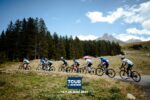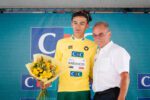He arrived at the Tour de l’Avenir already with a big reputation. It is not usurped, if we judge by the superiority exercised by Cian Uijtdebroeks on the 58th Tour de l’Avenir which ended over the Iseran pass in the mountain village of Villaroger, in the Haute-Tarentaise.
At nineteen years old since February 28, Cian Uijtdebroeks is not only the youngest winner of the Tour de l’Avenir, but he also joins a prestigious list of winners, such as Egan Bernal (2017), Tadej Pogaçar (2018) or the Norwegian Tobias Johannessen, last year’s winner, and he has a bright future ahead of him. The future will also tell whether a champion is born, but his victory will confirm Eddy Merckx’s words of praise for the new phenomenon of Belgian cycling, which are even higher than for Remco Evenepoel!
For the time being, his triumph in the Tour de l’Avenir is more of a confirmation, despite his young age, than a pure revelation, since the great Belgian hope has been pre-empted from the junior category by the Bora-Hansgrohe team for which he is already racing at World Tour level and with which he is committed until 2025. In any case, Cian Uijtdtebroeks, who had been noticed for his performances in the junior category – such as his number in last year’s Classique des Alpes – dominated the pack of the world’s best hopefuls in his first year in this category, winning (like Bernal in 2017 or Johannessen last year) the first two mountain stages (in Saint-François-Longchamp and La Toussuire) before easily controlling the situation in the last stage.
This allowed a breakaway to develop on the first part of the course, well before approaching the majestic Col de l’Iseran, and the Italian Lorenzo Milesi, a beautiful and versatile rider, signed the victory in the last stage at the end of a high mountain day. Cian Uijtebroeks was already familiar with the scenery and had already climbed the Iseran four times on this occasion, for training purposes, but also for the pleasure of the eyes. The young Belgian, as nice as he is efficient, seems to be solidly armed to make a career in the Grand Tours and the talent expressed on this Tour de l’Avenir is undeniable. It remains to measure the exact level of the competition that he dominated to a large extent. Norwegian Johannes Staune-Mittet (2nd) and German Michel Hessmann (3rd), who secured the final podium, were the most attractive of his opponents, along with Irishman Archie Ryan and Italian pocket climbers Piganzoli and Fancellu.
For the rest, the French team was generally below expectations, despite the beautiful stage victory of Romain Grégoire in Oyonnax, still offensive in the final stage and logically designated super-combative of the Tour de l’Avenir. Best French rider in the final classification, Lenny Martinez (8th) was not able to fully demonstrate the extent of his climbing skills, but he is also only nineteen years old and no doubt the Tour de l’Avenir is an essential learning phase.
Generally speaking, this edition confirmed the overall progress of the Nordic nations, Norway in particular, which now has a reservoir of talent, while the Colombians, traditional players in the event, were completely transparent this time.


